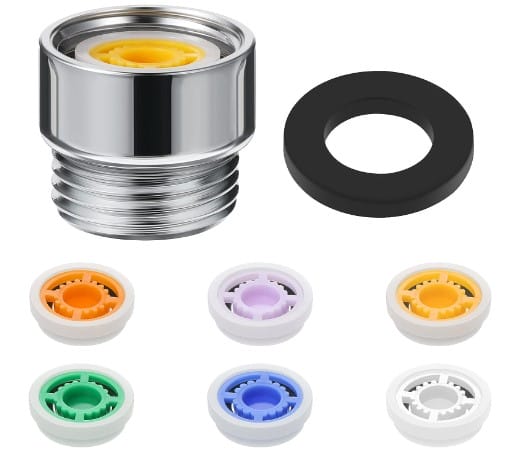Removing a flow restrictor is illegal due to the US Energy Policy Act of 1992 makes it unlawful to remove a flow restrictor, It is important to check with your local city water department to determine if it is allowed in your area.
Removing the flow restrictor could cause faucets and showering devices to no longer meet the codes and regulations. Apart from potential legality issues, removing the flow restrictor can also impact water pressure and flow, which may not be desirable for everyone.
While it may not be illegal in certain locations, it is important to consider the implications and potential violations before removing a flow restrictor from a shower head or faucet.
Introduction To Flow Restrictor Removal
Removing flow restrictors from faucets and showerheads may not be illegal in some locations, but it can violate building safety codes and water restrictions. It’s best to consult with your local city water department to ensure compliance and avoid any legal issues.
What Is A Flow Restrictor?
A flow restrictor is a device used in faucets and shower heads to limit the water flow rate. It is typically a small disc or screen that reduces the amount of water passing through.
Why Are Flow Restrictors Used In Faucets And Shower Heads?
Flow restrictors are used for water conservation purposes. They help to reduce water usage and save energy by restricting the flow rate without compromising usage experience.
Importance Of Water Conservation And Flow Restrictors
Water conservation is crucial for sustainable living. Flow restrictors play a significant role in conserving water by limiting the flow rate without affecting functionality.
Brief Overview Of Flow Restrictor Regulations
Many plumbing codes and regulations require faucets and showering devices to meet specific flow rate standards. Removing flow restrictors may result in non-compliance with these regulations.
Legal Implications Of Removing Flow Restrictor
Removing flow restrictors from faucets and showerheads is a common practice to increase water flow. However, the legal implications of doing so can vary depending on the location.
Understanding Local Water Restrictions And Regulations
In Texas, for example, removing flow restrictors may be considered illegal if the city has implemented water restrictions. It is advisable to contact your local city water department to confirm whether it is allowed.
The consequences of removing a flow restrictor without proper authorization can vary. In some cases, it may result in fines and penalties, especially if it violates plumbing codes or water conservation regulations.
Important Note: It is always recommended to consult with local authorities or professionals before making any modifications to your plumbing fixtures to ensure compliance with the law.
Technical And Safety Considerations
When it comes to removing flow restrictors, there are technical and safety considerations to keep in mind. One of the main impacts of removing the flow restrictor is an increase in water pressure. This may seem like a benefit, but it can actually have negative effects on your plumbing system. The increased pressure can put a strain on pipes, fittings, and fixtures, leading to potential leaks or damage. Additionally, removing the flow restrictor can result in exceeding maximum flow rate regulations, which may be a violation of plumbing codes.
If you’re looking to increase water flow without removing the restrictor, there are DIY methods you can try. For example, cleaning or replacing clogged aerators and showerheads can help improve water flow. Another option is to install a high-pressure showerhead or faucet that is designed to provide a stronger stream without removing the restrictor. These alternatives can help you achieve better water flow while still complying with regulations and maintaining the integrity of your plumbing system.
Frequently Asked Questions On Is It Illegal To Remove Flow Restrictor?
Is It OK to Remove The Flow Restrictor?
Removing the flow restrictor from a faucet or showering device may not be okay and could potentially violate plumbing codes that require a maximum flow rate for water conservation purposes. It is advisable to check with local city water departments or authorities to confirm if it is legal to remove the flow restrictor in your area.
Is It Illegal To Remove Flow Restrictor Faucet?
It may be illegal to remove a flow restrictor from a faucet in some areas. To ensure compliance, it is best to contact your local city water department to determine if there are any water restrictions in place that prohibit the removal of flow restrictors.
Does Removing The Flow Restrictor Increase Pressure?
Removing the flow restrictor from a showerhead can increase the water pressure. However, it may no longer comply with plumbing codes that limit the maximum flow rate. It is important to check with local regulations before removing the flow restrictor.
What Is The Shower Head Restrictor Law?
The shower head restrictor law is a regulation that requires faucets and shower devices to have a maximum flow rate to conserve water. Removing these restrictors could cause devices to no longer meet these codes. It may be illegal to remove restrictors in areas with water restrictions.
Can I Legally Remove The Flow Restrictor From My Shower Head?
Yes, it may be illegal to remove the flow restrictor in some areas due to water conservation regulations. Check with your local city water department to be sure.
Conclusion
Removing flow restrictors from faucets and showerheads may seem tempting to increase water pressure, but it is important to consider the legal implications. Many plumbing codes have specific regulations regarding flow rates to conserve water. Removing flow restrictors can lead to a violation of these codes, and in some areas, it may even be illegal.
It is crucial to check with your local city water department to ensure compliance with the regulations. Remember, water conservation is a collective effort, and adhering to these regulations helps protect our valuable natural resources.

